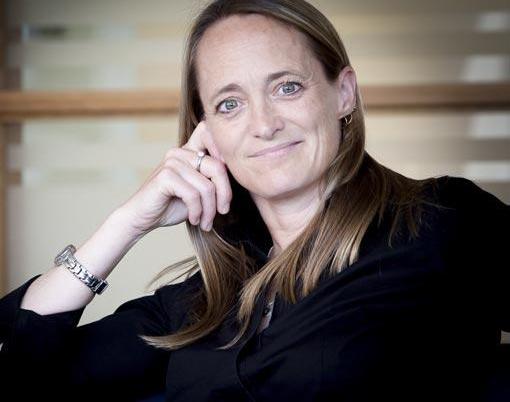
33 minute read
SCHOOL NEWS
Advancing research to help families, protect the public, and save the planet
With the latest federal government grants from the Social Sciences and Humanities Research Council (SSHRC) and other backing, faculty are delving into timely legal, political, and philosophical subjects. For other research projects, see Faculty News on pp. 13-15.
Metcalf explores how institutions can help or hinder effective climate action in Canada
According to NASA, 2020 was one of the hottest years ever on Earth. In Canada, nearly half of Nunavut’s super-thick Milne Ice Shelf collapsed into the sea, and changing weather patterns wreaked havoc through hurricanes, wildfires, storms, and flooding. Climate scientists agree the need for action is urgent, but the public, even in Canada, is less convinced. Such is the environment in which Professor Cherie Metcalf, Law’02 (Artsci’90), has once again seen her research and perspective valued.
She has received a $97,500 Insight Grant from SSHRC for “Institutions for Effective Climate Change Action,” a four-year interdisciplinary project with a U.S. collaborator, Professor Jonathan Nash of Emory University.
A $10,000 grant from the Canadian Foundation for Legal Research followed for her project “Climate Change and Canada’s Constitution,” focused on ways Canada’s constitutional structure influences prospects for effective climate action.
For her first project, Metcalf reviews regional and political divisions that have made climate policy-making difficult. “If Canada is to be successful in meeting its ambitious Paris Agreement targets,” she says, “we must think about how best to use different governance strategies to garner public support.” That’s a challenge, she admits, especially with people disputing facts that scientists assure us are not in doubt.
“When certain influential private actors adopt policies, does that help engage climate skeptics and political conservatives? Could action by local government as opposed to national government, for instance, broaden the reach? Or possibly using market players?” To answer such questions, Metcalf will look at the ways different institutions – coalitions of large firms, the Intergovernmental Panel on Climate Change (IPCC), national and regional governments, the insurance industry, etc. – influence public reaction to climate change policies.
The project will ultimately provide insights into whether a multi-institution strategy can generate the public support that’s essential. To gather a rich body of new data to analyze, Metcalf is using a series of multiple experimental surveys, each on particular climate risks and policies, and collecting participant responses. Research assistants are helping her with background for the surveys on CanadaU.S. climate laws. Metcalf has already presented a draft paper outlining their research design and preliminary results at seminars and conferences in the U.S.
Her second project also incorporates an interdisciplinary approach and data-gathering surveys. Regarding provincial challenges (such as Ontario’s campaign against Ottawa’s cap-and-trade mitigation strategy), she is reviewing legal options for climate action by looking at how Canada’s division of powers may affect popular reaction when new policies and laws are announced.
She has an article forthcoming, with a student co-author, that explores the impact federalism has on Canada’s response to both the pandemic and climate change, two existential threats to the country. It also considers how actions at multiple levels of government can complement each other for more effective policy.
She is writing a second article examining the recent Supreme Court decision in the constitutional challenge to the federal Greenhouse Gas Pollution Pricing Act and its possible implications for future federal vs. provincial authority over climate action, whether mitigation or adaptation.
Professor Cherie Metcalf
GREG BLACK
Lahey and Amani on $2.5M-project team helping to design childcare policies for diverse families throughout the world
Fallout from COVID-19 has amplified a related crisis: access to affordable childcare as a major obstacle to income equality in Canada and globally. The impact of so many parents working long shifts in demanding essential services – or being driven out of paid work to provide their own family care coverage – was all too familiar to Queen’s Law professors Kathleen Lahey and Bita Amani, co-founders of Feminist Legal Studies Queen’s (FLSQ). With history professor Lisa Pasolli, also a leading international expert in care issues, they are participating in an international interdisciplinary team that is launching its six-year project, “What Is the Best Policy Mix for Diverse Canadian Families with Young Children? Re-imagining Family Policies.” The project, based at Brock University, has received a $2.5million Partnership Grant from SSHRC.
The Queen’s grantees are part of a huge team: 29 coinvestigators, 24 collaborators, and 34 partners. By 2027, 70 graduate and undergrad students and several postdocs will be trained. Under study are three core issues – childcare services, parental leave policies, and employment policies –and ways they impact diverse Canadian families –Indigenous, racialized, newcomer, single-parent, student, LGBTQI2S, low-income, and rural.
Pondering how government budgets – normally inadequate for childcare – could address the pandemic’s more intensified forms of women’s unpaid care work, Lahey Professors Kathleen Lahey and Bita Amani
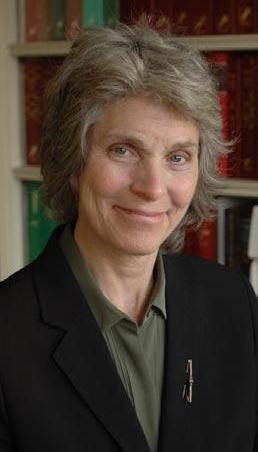

GREG BLACK
is co-leading a taxation, law, and family policy project that crosses all three core issues, and, with Pasolli, continues working in the childcare cluster.
FLSQ involves students, faculty, and Kingston residents in research and conferences. Amani says, “We are delighted to take a lead in this foundational, collaborative, and interdisciplinary study. It promises transformative changes for Canadian families with children needing care.”
Webber further explores how comprehension of ‘the good’ underpins law-making
In his latest research project, “Recovering the Good in Law,” Professor Grégoire Webber explores the interplay between moral philosophy and the making of law. He believes that “the good” – long the dialectical fodder of philosophers –also underpins how legislators make laws.
Webber, Canada Research Chair in Public Law and Philosophy of Law, says, “In formulating public policy and legislation, governments often premise new laws on the promotion of things that are good for persons, like education, health, and family.” Yet, he observes, under Canada’s Charter, judges are often reluctant to have recourse to ideas of the good when evaluating whether legislation is justified. “Courts regularly dismiss such appeals as hypothetical, intangible, or lacking in evidentiary support. The concern is with justifying laws on contested and controversial understandings of the good.”
His study of the situation has attracted attention: an $85,000 Insight Grant from SSHRC. “I will devote almost all of those funds to helping train the next generation of brilliant researchers and giving them access to an intellectual community of others working in philosophy, political theory and law,” he says. “This summer, I have three student research assistants working on the project.”
Webber’s goal is to recover the good in law and produce a book that complements the arguments he pursued in three former books: The Negotiable Constitution (2009) and Legislated Rights (2018) (both Cambridge University Press) and Droits et droit (Thémis, 2020). r

GREG BLACK
Grey explores what is (and is not) morally acceptable in deportations
How do government officials morally justify their decisions to deport non-citizens in cases where there are “humanitarian” and “compassionate” grounds not to deport them for committing a crime? SSHRC has awarded Professor Colin Grey, with collaborator Professor Sharry Aiken, $41,742 to find answers.
“Since 1967, Canada’s immigration law has included humanitarian and compassionate exemptions from deportation,” Grey says. “These exemptions inscribe a certain kind of morality into the law, requiring officials to engage in moral reasoning rather than simply applying the rules. We are looking more closely at how officials apply this humanitarian exemption power.”
By reading deportation decisions, the “Humanitarianism and the Justification of Deportation for Criminality” project team is trying to clarify how officials weigh such things as personal responsibility and remorse against hardship. Grey aims to develop a sociological theory of officials’ moral reasoning, compare it to the case law and philosophical Professor Colin Grey

King explores ‘borrowing’ of judges in transnational commercial litigation

Professor Alyssa King When judges retire or reach the mandatory age in their common law jurisdiction, they may be hired by courts in other jurisdictions. English judges do not even have to wait for retirement; they, too, may sit as “foreign” judges on domestic courts such as the Hong Kong Court of Final Appeal, as well as special-purpose international commercial courts in countries such as Dubai and Kazakhstan. Professor Alyssa King is studying foreign judges’ roles in transnational commercial litigation for a “Travelling Judges, Moonlighting Arbitrators, and Global Common Law” project, for which she received a $27,370 SSHRC grant.
She and collaborator Pamela Bookman (Fordham Law School, NYC) are examining the phenomenon of foreign judges, the motivations of the countries hiring them, and the effects these judges have on the judiciary and norms of judicial independence. King hopes to provide insights for the countries that both send and receive foreign judges, as well as their possible contributions to comparative law.
Bala and team examine COVID’s impact on justice for families in Ontario
“After the pandemic lockdown in March 2020, we saw more family stress and domestic violence,” says Professor Nick Bala, Law’77. Together with Western Professors Claire Houston, Law’07 (law), and Rachel Birnbaum (social work), and Queen’s LLM student Kate Deveau, he has been studying how Ontario’s family justice system responded. The closing of court houses, the restricted access to family law offices and clinics, and the shift to electronic services have all had dramatic effects.
“Self-represented litigants and those without internet, and their children, have suffered from a lack of access to family justice,” Bala says. However, for lawyers and clients with sufficient resources and the right type of cases, the shift to electronic court filing and to Zoom meetings and hearings has made the family justice process more efficient and effective, so the team is also studying which changes should continue. They have already done a number of presentations to share preliminary findings and will be publishing the study results in a number of places, writings about immigration, and see how these three ways of looking at the justification of deportation compare to one another.
including the international journal Family Court Review.
The team has received a total of $45,000 in grants from the Law Foundation of Ontario and the Association of Family and Conciliation Courts’ Ontario Chapter.
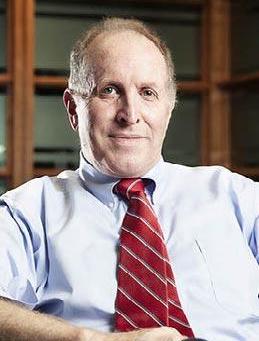

International economic & IP law scholar, a PhD’16 alumnus, to join faculty
Oluwatobiloba (Tobi) Moody, PhD’16, returns to Queen’s in January 2022 after overseeing the establishment of the first Sub-Saharan African External Office of the World Intellectual Property Organization (WIPO) in Nigeria. There he interfaces with key intellectual property (IP) institutions and stakeholders to promote awareness, training, and capacitybuilding in the IP field and across WIPO’s global services.
Of his appointment as Queen’s National Scholar in International Economic Law, Dean Mark Walters says, “Tobi will add intellectual depth and experience to an international law group at Queen’s that is probably the strongest in the country. He will also bring an infectious enthusiasm for teaching and learning. We are very fortunate.”
Previously, Moody was a WIPO staff member (2012-2014) and consultant (since 2016), and a post-doctoral fellow (20172019) with the Waterloo-based Centre for International Governance Innovation (CIGI), collaborating with Canadian and multilateral institutions and researchers to shape CIGI’s work in traditional knowledge governance.
Moody, who holds an LLB from the University of Ibadan in Nigeria and an LLM from the University of the Western Cape in South Africa, received a Vanier Canada Graduate Scholarship for his Queen’s doctoral studies on “WIPO and the Reinforcement of the Nagoya Protocol.” Though specializing in international IP law’s intersections with international economic law, trade law, and human rights law, he has a particular focus on protecting the “traditional knowledge” of Indigenous and other societies.
His most recent publications include a chapter on “Trade-Related Aspects of Traditional Knowledge Protection” in Indigenous Peoples and International Trade: Building an Equitable and Inclusive International Trade and Investment Agreement (Cambridge University Press, 2020) and an article, “Climate Action and Sustainability: Indigenous Peoples Are Part of the Solution,” in WIPO Magazine (January 2020).
“My Queen’s Law experience as a doctoral student was phenomenal,” says Moody. “The opportunity to contribute to the training of the school’s next generation of lawyers, while still conducting important research in my area of international economic law, was a special attraction to apply.”
New journal bridges gap between practice and academia in commercial arbitration
Responding to arbitration’s increasing popularity as a means of resolving business disputes, Queen’s Law has partnered with Juris Publishing and a group of senior Canadian academics and practitioners to produce the Canadian Journal of Commercial Arbitration (CJCA), which launched last June.
Associate Dean Joshua Karton, CJCA’s Managing Editor, says, “Our goal is to become not only a useful source of information for Canadian practitioners and scholars – and those elsewhere with an interest in Canadian arbitration –but also a focal point of our vibrant and growing professional community.” Each issue, he adds, contains “news you can use in your next counsel engagement or arbitral appointment, plus broader thematic or theoretical discussions that explore commercial arbitration law and practice in thoughtprovoking ways.” Supporting the executive editors’ work is a team of student editors earning academic credit. CJCA also organizes educational events and maintains an active blog. Each issue is available in full for free on the journal’s website (cjca.queenslaw.ca/). Tobi Moody of Nigeria, PhD’16, is hooded at Convocation in Grant Hall.

GREG BLACK
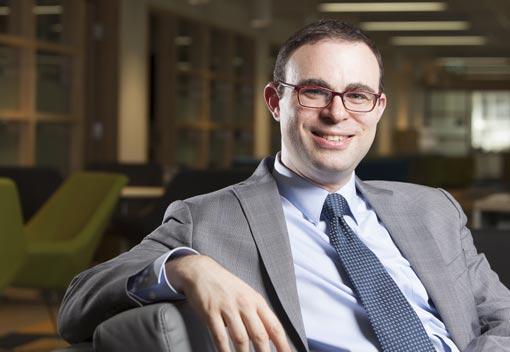
Associate Dean Joshua Karton is Managing Editor of the Canadian Journal of Commercial Arbitration that launched last year.
GREG BLACK

First Nations leader is school's first appointee to new diversity and inclusivity post
Stacia Loft will play a key role in what promises to be a period of transformative change at Queen’s Law. On June 22, the Law’20 graduate returned to campus to start her new job as the school’s first Director of Indigenous Initiatives and Equity, Diversity, and Inclusivity (EDII) Programs.
“I’m excited to pioneer new pathways to education for Indigenous, racialized, and marginalized people who may not have the opportunity, or who may not see possible ways, to be successful through studying law,” she says.
In her new role, she will champion holistic change management policies, develop long-term initiatives to foster a welcoming and inclusive learning and work environment, and provide both cultural and academic support to equityseeking students. She also plans to build strategic partnerships for them across campus, the city and beyond: government agencies, NGOs, industry associations, etc.
Dean Mark Walters, calling Loft’s arrival “timely and important,” says, “We are continuing to work towards the ideals of reconciliation and inclusivity to ensure that our school embraces diversity and empowers individuals from culturally, racially, and socioeconomically diverse backgrounds to thrive. We look forward to Stacia’s vision and stewardship of this process to further expand a culture of inclusion through meaningful actions.”
The appointee brings a great deal of experience to the new position: working at the provincial level, working in elected First Nation positions, and working with Indigenous youth (in both Toronto and the Commonwealth of Dominica’s Indigenous Kalinago Territory). “Supporting people, not only within my family, but in my community and broader communities,” she says, “brings a different perspective to the work – not only through an Indigenous lens, but also through a lens of lived experience.”
Loft, from the Tyendinaga Mohawk Territory, was recognized as a community builder, policy advocate, facilitator, and change-maker when she was elected last November as Deputy Grand Chief of the Association of Iroquois and Allied Indians (AIAI). In that role, she supports the provincial and territorial organization’s seven member Nations.
“My role there is one of advocacy and ensuring that our inherent and treaty rights are respected and recognized by the entities that we have to do business with, including federal and provincial governments,” she explains. “The rights for which we advocate range from traditional hunting and fishing to our sovereign ability to monitor ourselves, make our own laws, and use our own jurisdictional approaches.”

Stacia Loft, Law’20, the inaugural Director of Indigenous Initiatives and Equity, Diversity and Inclusivity Programs at Queen’s Law, is ready to create pathways to legal education for Indigenous, racialized, and marginalized people.
GARRETT ELLIOTT
Doing all that has made her law degree even more valuable. She can see so clearly the importance of connecting other EDII people with that opportunity. Loft meets with cabinet ministers to raise member Nations’ issues and provides education and knowledge through such forums as the Chiefs of Ontario (for which she holds the justice and women’s initiatives portfolios) and the AIAI (for which she is the education portfolio holder).
Over the past 15 years, even while a law student, Loft was dedicating herself to empowering communities and supporting meaningful pathways to prosperity, most notably as Manager of Justice Programs at the Ontario Federation of Indigenous Friendship Centres, as a Band Councillor of the Mohawks of the Bay of Quinte, and most recently as an articling student with Amnesty International. She was gaining strategic and operational management and governance experience with local, provincial, and federal boards and advisory tables. She has served, too, as Board Director for Kenhte:ke Midwives and a Clinical Extern at Belleville’s Community Advocacy and Legal Centre, and she continues as a Board Director of the Tyendinaga Native Women’s Association.
To top it all off, Loft was called to the Ontario bar on May 21.
What is she looking forward to in her new directorship? “I’d really like to get a better understanding of what Queen’s University and Queen’s Law have committed to doing and what has been done so far in terms of the Truth and Reconciliation Task Force recommendations,” she says. “I’d like to read the five-year plan that was put into place, find out whether EDII has achieved what it set out to do, connect with the individuals involved, and take stock of how they feel things have gone.”
Taking time to reflect before moving forward is important to her. “Sometimes we want to see things move quickly, but at the same time we want to ensure that things are done in a good way, that those supposed to be engaged actually are engaged in the process, and to determine whether recommendations made five years ago are still relevant. Perhaps priorities have changed.
“I look to see what needs to be done and how I can make that happen,” she continues. “I want to create space for Indigenous, racialized, and marginalized individuals to share their experiences. It’s about a collective approach to making sure that an environment exists where people feel welcome and respected and where their experiences and viewpoints are actually utilized, contributing to a much bigger process. As an Indigenous person, I know how important it is that we see ourselves in this work. We need to be voices at the table, and we need to be part of these processes – and we’re going to bring others along the way.”
Clearly, one key word in Loft’s directorship is going to be “we,” not “I.” — LISA GRAHAM
Law’s 5-year plan for transformative change
The roadmap has been set to help guide the school’s decisions and actions over the next five years and to inspire the very best in its students, faculty, staff, alumni, and partners. Following an extensive consultation process that started last September to engage all members of the Queen’s Law community, Faculty Board endorsed the school’s Strategic Framework 2021-2026 in May.
In the introduction, Dean Mark Walters, Law’89, writes, “Our aim for this Strategic Framework is this: by 2026, Queen’s Law will be a community of scholarly excellence that provides the best legal education in Canada. We will solidify our intellectual trajectory and elevate our international and national reputation for research excellence. We understand the power of legal education, scholarship, and practice to change society and to initiate a lifetime of learning. In our teaching, research, practice, and service, we will reflect an abiding commitment to access to justice and reconciliation and will honour Queen’s Law’s tradition of dynamic, inclusive, and transformative community.”
The Framework sets out the school’s vision, mission, goals, and strategic priorities, along with its initiatives and performance measures. Read the full document at law.queensu.ca/about/governance/strategic-framework.


Latest from Queen’s to secure coveted Supreme Court clerkships
For 2022-2023, Alysha Flipse and Rachel Oster, both Law’20, will be heading to Canada’s highest court to learn from two of the country’s top jurists as clerks with the Supreme Court of Canada (SCC). Alysha Flipse and Rachel Oster, both Law’20, Flipse, who will Supreme Court of Canada clerks 2022-23 clerk for Justice Sheilah Martin, is looking to build on the “invaluable experience” she gained clerking at the B.C. Court of Appeal this year. “I am thrilled to be part of the unique legal environment at the SCC but also to learn as much as I can during my time there,” she says. Her counterpart, Oster, is spending 2021-22 with the Ontario Court of Appeal before she will clerk for SCC Justice Mahmud Jamal. prisoners, “such vulnerable and often misunderstood individuals,” he says. “Clearly, it’s important work that we do, given that our clients often have nowhere else to turn. They always seem very grateful for the help.”
Former clinic caseworker returns as lawyer helping break barriers to justice
Jane Mundy, Law’18, formerly a student caseworker with Queen’s Legal Aid (QLA) and the Prison Law Clinic, returned to Kingston last summer as Review Counsel for QLA and the Family Law Clinic. She also articled with QLA and the Business Law Clinic. Now she supervises student caseworkers, helps develop and teach classes – and has a quest. For many people needing legal services, the cost can be a barrier to justice, she says. So can other issues disproportionately affecting marginalized individuals: mental illness, addictions, disability, race and gender identity. The clinics, says Mundy, are her opportunity to help her hometown people face these barriers.
Paul Quick, Law'09, a staff lawyer with the Queen’s Prison Law Clinic (QPLC), with help from students Ryan Mullins, Law’20, and Alexa Banister-Thompson, Law’21, has used Canada’s Charter to change the liberty rights of prisoners throughout federal prisons. “Many people were being kept in prison for no reason whatsoever,” he says, “not being punished for anything, just being ignored by a system not caring enough to see they were already entitled to release.” His team took action. They presented a test case, John Howard Society of Canada v. Her Majesty the Queen, to the Ontario Superior Court of Justice in Kingston, challenging the constitutional validity of Section 163(3) of the Corrections and Conditional Release Regulations which, under Charter Section 7, protect “rights to life, liberty, and security of the person.” Specifically, Quick challenged the provision that, in all cases, gave the Parole Board of Canada 90 days to make “post-suspension decisions.” “Our case dealt with the common situation of prisoners near the end of their sentence being given a new statutory release date that entitled them to automatic release as soon as the Parole Board made any decision,” Quick explains. “Since the Board had 90 days to do that, these inmates sat in prison just for the Board’s convenience.” In January, the Court agreed that the 90-day timeframe’s impact was “arbitrary, grossly disproportionate, and a serious violation of these prisoners’ liberty rights.” QPLC Director Kathy Ferreira, Law’01, calls it an important victory. “The provision struck down had caused Jane Mundy, Law’18 great frustration to prisoners and their lawyers for decades. Now prisoners will be released as soon as they are entitled to be, with certainty and stability as they reintegrate.”
From clinic articling student to lawyer
After completing his articles with the Queen’s Prison Law Clinic (QPLC) this year, John Luscombe, Law’20, was hired as a staff lawyer. Now he represents clients before a variety of tribunals, including prison disciplinary courts for serious offences and the Parole Board for applications such as release and release conditions. Though his student casework was with the Business Law Clinic, Luscombe finds it “very rewarding now to help John Luscombe, Law’20

Prison Law Clinic wins constitutional challenge on liberty rights
In an important victory by the Queen’s Prison Law Clinic for prisoners throughout the federal system, prisoners will be released as soon as they are entitled to be, and this will provide certainty and stability as they reintegrate back into their workplaces, families, and communities.
Order of Canada membership for PhD student advancing access to justice
Law’23 student wins provincial award for advancing equality rights

Michele Leering, PhD in Law candidate, has been appointed a Member of the Order of Canada for her dedication to helping vulnerable and marginalized populations gain access to legal services and the justice system. Leering, a part-time lawyer and the Executive Director of the Community Advocacy & Legal Centre in Belleville, Ont., says, “The award recognizes the value of the communitybased justice work carried out by Ontario’s community legal clinics to ensure equal access to justice, human rights, legal literacy, and the ‘legal health’ of people on low incomes.”
She sees such activism as “integrally related to legal professionalism.” It is her long-time professional passion and focus – and also her doctoral dissertation subject. She is documenting the imperatives for legal education reform, focusing on reflective practice as a core professional competency benefiting law professors, students, and practitioners.
Her research on the importance of reflective practice, Canadian and Australian legal educators’ approaches, and the scholarship of teaching and learning in law have been presented at some 40 conferences and workshops in Canada, Australia, the U.S., and the U.K. since she began PhD studies in 2015. She has also published three peerreviewed articles, contributed to an experiential learning guide for law students, and designed a curriculum to introduce reflective practice.
Natalie Zhang, Law’23 (MA’20), who has spent several years studying and advocating for minority groups and is involved in a Charter challenge, received the 2021 Aird & Berlis Equality Award from the Women’s Law Association of Ontario. As a board member of the non-profit provincial Michele Leering, CM, PhD in Law candidate
Leering’s thesis co-supervisors consider her CM recognition well deserved. Professor Erik Knutsen says, “Michele has worked tirelessly to connect society’s lessadvantaged with the law. Her groundbreaking cross-jurisdictional research about legal education will go a long way to help us better understand how people teach and learn the law.” Professor Sharry Aiken agrees: “Michele’s path-breaking contributions to access to justice and law reform have been exemplars.”
organization WomenatthecentrE, she has been speaking on behalf of intimate partner violence survivors to different service providers and organizations since 2019. “This board membership provides me with a platform to advocate for and support refugee women, especially racialized refugee women and children who experienced persecution from their home countries and were traumatized again by the legal and social welfare system in Canada.” As an MA student, she wrote an “A+” thesis, “Engendering Canada’s Refugee Process,” and won the 2020 Bev Baines Award for Outstanding Service for her commitment to improving equity and inclusivity.
The Charter challenge started in February after Zhang, a single mother who had been living in a shelter and fighting for asylum, was denied access to the Canada Child Benefit and informed she must repay $18,000 that she received in error. She and two other women filed a lawsuit against the Government of Canada claiming discrimination against low-income families with uncertain immigration status. Receiving media attention, she says, “I hope to bring public attention to a marginalized, voiceless group with precarious immigration status.” For the next two years as a JD student, Zhang will continue to pursue her goal of a legal career in improving social justice. Natalie Zhang, Law’23

QLR
In the innovation zone with fast-moving Conflict Analytics Lab

The Conflict Analytics Lab is launching the first iteration of Vaccine Mediator, an online dispute resolution tool to serve as Canada’s first system for self-reporting vaccine side-effects and assessing whether those suffering the side-effects are eligible for compensation. It will help process injury claims more efficiently while promoting access to justice.
Since its 2018 launch as a joint project of Queen’s Law and the Smith School of Business, the Conflict Analytics Lab (CAL) has been producing novel and newsworthy ways to apply data science and machine learning (artificial intelligence, or AI) to dispute resolution. Most recently, this global consortium led by Law Professor Samuel Dahan has generated ways to help the legal profession and the Canadian and American public, while serving as an inspiration for its students.
BY LISA GRAHAM
Queen’s-Oxford collaboration using AI to streamline vaccine injury claims process
The Conflict Analytics Lab, in collaboration with researchers from Oxford University, University College Dublin, and Paris Dauphine, has developed an online dispute resolution tool called Vaccine Mediator. This innovative tool will help governments process vaccine injury claims more efficiently, mitigate the need for civil proceedings, and help ease people’s vaccination hesitancy. It was launched as part of CAL’s AI-powered legal aid platform MyOpenCourt.
Professor Samuel Dahan, CAL Director, says, “We are keen to address access to justice issues through the provision of a personal, easy-to-use, and cost-effective infrastructure for the Canadian public and our neighbours in the United States.”
People who have experienced severe adverse reactions to an approved vaccine can use Vaccine Mediator (VM) to report possible side-effects. VM then pre-assesses their eligibility for compensation, provides them with a selfreport and a personalized, jurisdiction-specific next-steps guide, and enables them to submit a pre-drafted claim to the relevant government agency.
Compensation frameworks, like Canada’s Vaccine Injury Support Program released on June 1, set out levels of compensation based on the extent of harm suffered – a framework particularly important amid the masses of people being vaccinated as protection from COVID-19.
The most effective way to deploy a compensation structure, Dahan explains, is to complement it with a mediation system. “We’ve heard of doctors dismissing claims from patients who’ve reported serious side effects from approved vaccines,” he says. “Eventually more costly litigation could arise and really cause the government a serious problem.”
Transatlantic origins and student builders at work. The idea for Vaccine Mediator arose last winter when Dahan’s long-time research partner, Professor Duncan Fairgrieve of the British Institute of International and Comparative Law, began working with Oxford University to develop a bespoke vaccine injury compensation plan for the U.K. The pressing need for such plans was being articulated by doctors, lawyers, and families world-wide.
Helping to build Vaccine Mediator were seven gifted CAL students: Avinash Pillay, Solinne Jung, Yoonhyun Cho, Anushka Pharthyal, and David Liang (Law); Cindy Lin (Business); and Tobias Carryer (Computing Science).
Pillay, project lead, explains, “We analyzed the survey design and underlying legal basis for each compensation scheme in use around the world to create a ‘universal’ selfreporting tool that can work with both present and future no-fault programs. Then we analyzed data sets from their self-reporting databases to find vaccine injury trends that can inform our AI on the correlation between a symptom and the vaccine dose in question. Our research assistants codified these trends, designed the infrastructure for VM, and converted it to a script that could be implemented on MyOpenCourt.”
Next steps for VM 2.0. For the next iteration of Vaccine Mediator, CAL aims to use the self-reported data from the first, along with survey and curated medical data, to build and then operate a more robust screening system to assess claims’ validity. It will also identify potential remedies for injured persons.
VM will ultimately serve two additional roles: as a misinformation detection and rectification tool on vaccine side-effects and legal remedies; and as a predictive analytics system through which human mediators can assess whether the symptoms reported are medically recognized side-effects that could possibly affect people’s compensation eligibility.
As Dahan explains, “Information gathered and analyzed from the first iteration will be used to help users assess whether their symptoms are drawn from false information. We’ll help combat the spread of misinformation by providing real-time, up-to-date vaccine injury facts. Our Mediator’s flagship feature will connect users to online dispute resolution professionals who can guide them through the entire process from application to settlement.”
BLG partners with Queen’s to create AI-powered dispute resolution system
“Our Intelligent Settlement System (ISS), with predictive assessments and models based on AI, will help lawyers do their jobs better,” says George Wray, Law’05 (Artsci’00), a partner with Borden Ladner Gervais LLP in Toronto and leader of its joint initiative with Queen’s Conflict Analytics Lab.
The ISS, under production, will give personal injury litigators an objective tool to better assess cases and to help search out pre-trial and negotiation strategies with optimal outcomes. Its most immediate anticipated benefits include improving consistency and efficiency in dispute negotiation and settlement; projecting litigation outcomes; and understanding the specific demands, negotiating techniques, and settlement ranges across individual law firms.
This collaboration – BLG’s latest with CAL – will be crucial for both the lab’s research and the legal profession because it could help lawyers move beyond what Professor Samuel Dahan, CAL Director, calls a “sub-optimal intuitive approach to
BLG’s George Wray, Law’05 (left), and Wendi Zhou are working with Professor Samuel Dahan and the Conflict Analytics Lab to produce the Intelligent Settlement System. negotiation.” ISS helps personal injury lawyers resolve disputes by showing them what would happen if a court were to decide the matter. “Calculating the odds of winning a court case is challenging,” he explains; “judicial decisions are shaped by hundreds of legal (and often non-legal) factors. Also, in many areas, such as consumer, municipal, and health disputes, about 90 per cent are resolved through negotiation. Predictions based solely on past legal precedents can be inaccurate.”
Instrumental in ISS development is Wendi Zhou, BLG’s Manager of Strategic Research, a CAL research fellow, and a Smith School PhD student. She says, “This project will significantly impact the way experienced lawyers quantify their accumulated knowledge.” In Wray’s view, “ISS’s deeper value may lie in services that firms can offer clients – for example, assessing potential exposure across a company’s entire litigation portfolio, breaking down that exposure by type of issue, and budgeting for current and future spending across its broader business.
“Finding out what else the AI system can help lawyers do is exciting.”
With Queen’s CAL, Fasken invests in its lawyers’ ongoing professional education
“By partnering with Queen’s,” says Robert Garmaise, Fasken’s Chief Innovation Officer, “we combine the Conflict Analytics Lab’s multidisciplinary analytics research and academics with our lawyers’ practical insights.”
Queen’s law and business experts are now teaching a dynamic program to Fasken lawyers, staff, affiliates – and clients. It focuses on a diverse array of topical issues with direct impacts on legal practice. “We are offering sessions for our firm Robert Garmaise, CIO members and clients to explore of Fasken, which has both the hard and soft skills partnered with the Conflict demanded in today’s legal Analytics Lab to ensure services market,” says Garmaise. the firm stays ahead of
Teaming with CAL, he adds, technological trends lets Fasken appraise the legal affecting legal services. industry through the lens of academics on the frontiers of research, ensuring that Fasken stays ahead of technological trends affecting legal services.
Professor Samuel Dahan, CAL Director, explains how the joint initiative works: “Queen’s scholars present their own research – insights directly from the subject matter experts – and we provide networking opportunities for those looking to dive further into an area of interest.”
Through the partnership, a series of timely Continuing Legal Education sessions will continue to be developed for Fasken members and clients. Technical topics include contract management, cybersecurity and risk, data science and algorithms, data management, the ethics of AI, legal application of data analytics, negotiation, and legal matter management. For management, topics include diversity, resilience, sustainability, and managing bias. r

By video, Professor Samuel Dahan accepts the Stanley M. Corbett Teaching Excellence Award presented by the Law Students’ Society.
Dahan saluted for excellent teaching
For his Conflict Analytics Lab practicum and alternative dispute resolution and employment law classes, students chose third-year professor Samuel Dahan as 2021’s winner of the Stanley M. Corbett Teaching Excellence Award.
A nominator from CAL wrote, “Professor Dahan demonstrates a remarkable talent for helping his students achieve their fullest potential. His passion for his work is inspiring, but even that is topped by the tremendous effort he puts into helping students succeed.” (Through CAL, that student worked on pandemic projects that helped some 10,000 workers.)
Nominators also appreciated Dahan’s dynamic teaching approach, giving them hands-on learning through “complex and immensely educational negotiation simulations” in class, and integrating his vast negotiating experience into “meticulous slide decks” that students can use as a career resource.
Dahan’s students also wrote, “He tells us ‘the opportunities are here for our taking’ and actively pushes for new opportunities for every one of us.”
In his virtual acceptance speech, a delighted Dahan told the students that the award belonged to their collective achievements and efforts as much as to him. About the AI lab’s future, he said, “We’ve built an array of technologies from open access legal aid to intelligent negotiation systems for leading firms. This is just the beginning of an incredible ride, and there is just so much more we can do together.”
Students create legal tech platform and present it to the world
While working together last summer with the Conflict Analytics Lab, Law’22 classmates Avinash Pillay and Yoonhyun Cho got an idea: create a different type of legal tech platform to improve access to justice. “Goal One,” says Pillay, “is to reduce traditional overhead costs for legal practitioners by as much as 50 per cent through digitization. Two, create cost-effective ways for the general public to access legal services, ultimately expanding access to justice in traditionally marginalized communities.”
After consulting Professor Dahan about turning their vision into a business, they established Mouthpiece Law in January. Then, Pillay as COO & Chief Legal Engineer and Cho as CEO & Chief Legal Entrepreneur recruited two other core members: Daniel Moholia, Law’21, CIO; and Thabo Magubane of the University of KwaZulu-Natal’s Pietermaritzburg Law School, CTO.
Mouthpiece Law was soon accepted into the Legal Innovation Zone’s Concept Framework Incubation program, which helps foster and develop techniques to improve legal services and the justice system. Then in April, the team secured a spot to pitch their innovation at “Collision 2021,” one of the world’s largest technology conferences: global change-makers from e-commerce, social media, software companies, NGOs, start-ups, FinTech providers, investors, celebrities, and more.
“Collision connected us with angel investors and venture capitalists (VCs),” says Pillay. “The legal technology market is growing rapidly as lawyers realize antiquated billing and case management software are cost-inefficient. ‘AI’ is becoming a legal buzzword, and VCs seem increasingly driven to find ethical and ethnically diverse start-ups.”
As one Mouthpiece Law innovation, the team is developing MyLawyerProfile, a virtual networking platform for lawyers and law students that incorporates Non-Fungible Token elements to increase user engagement and satisfaction. Mouthpiece has also partnered with U.K.based start-up Legal Connection to bring modern case management to its platform, which is already being built in South Africa to provide legal aid to at-risk village populations. Next up, Mouthpiece Law’s “homework” is to pilot a legal aid taskforce.
QLR
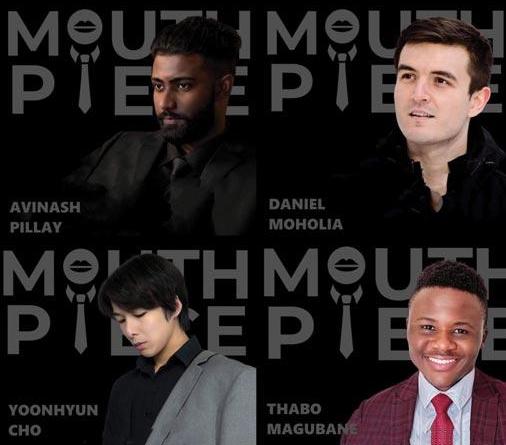
Legal-tech innovators (from top left) Avinash Pillay, Law’22, Daniel Moholia, Law’21, Thabo Magubane, and Yoonhyun Cho, Law’22, are re-imagining the future of legal systems with their Mouthpiece Law.






